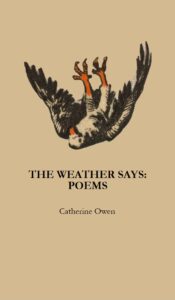‘Then maybe/we can keep having fun’
The Weather Says: Poems
by Catherine Owen
Spokane: Carbonation Press, 2024
$20.00 / 9781304231015
Reviewed by Carellin Brooks
*

It is an odd thing to write about weather, on the face of it. We know that in the absence of any other conversational topic—the Canucks, the latest fashions, the scandale du jour—it can be reliably summoned to fill the silence in an elevator. There are endless variations, but they all share one thing in common: safe and uninteresting. “We’d better make the most of this sunshine while it lasts,” and then, “Well, great to be getting some rain finally.” I myself have uttered the above, or suitable variations, at intervals in the last week or so as occasion demands.
Yet perhaps it is this very mutability, not of weather itself—humans through the ages have found that, to our sorrow, to be surprisingly unamenable to our wishes for predictability—but of our talking about weather that draws writers. Can a subject so seemingly banal nonetheless be interesting?
It’s what arguably drove poet Lisa Robertson to write The Weather, mining for her source material BBC shipping reports, surely not where you’d first think to find creative inspiration. As Robertson writes, slyly, of her subject: “Give me hackneyed words because/they are good.” Robertson herself studied earlier authors on the topic, including Wordsworth, Shelley, Coleridge, and Goethe. So no matter how hackneyed our words, surely if such august names lent their gravitas to the topic, it’s worthy of continued notice?
I myself once wrote an entire book, not even on weather generally, merely on precipitation. I wanted to put words to the various experience of rain in Vancouver: the endless piddle of grey days, the sudden fury of a squall. I was interested mostly not in rain itself but in the varied characteristics we assign to it here on the wet coast. Weather, as Robertson recognized, is a fiercely parochial topic: witness our mingled chagrin and glee when a new Vancouver arrival who has not yet experienced a winter remarks on how lovely it is: Just you wait.

Now Catherine Owen, a Vancouverite-turned-Edmontonian, has published The Weather Says: Poems. Owen backs into the topic with a set of notations she describes as “a precipitation”—a light pattering, a sprinkle. Why add to the pile of writing on the topic? Owen’s title provides a clue. “The weather says”—actually, strictly speaking, the weather says nothing, even as its increasing excesses implicitly critique the ruinous choices we make as a country and across the globe. In “One Moral Behind Silence” Owen (Moving to Delilah) imagines how it would speak: “Weather just stands before the dark screen/repeating—simply the typical—while/pointing to the humans encroaching here/and here, here and here, here here here here.”
Five sections, all titled Weather followed by a number, divide the collection. Weather 1 is where the book begins to lift. “Downpour” begins with this line: “When the weather says childhood, you/attend it like a flower.” This attending rewards both the poet and us with the freight that this essentially impersonal aspect of our lives can carry. “The wind is the main animal here” begins “Species, Iceland,” closing with this humbling thought: “Day & night you are aware/that you are even smaller than the human/you thought you were.”
Individually we may be that small, but collectively we change weather patterns, accelerate fires, intensify storms. We don’t, however, absorb that particular lesson very well, either globally or personally. Instead, we blame the victim. We assign agency to weather: we take it personally. We forget that weather is not us: it does not respond to our every mood, or obligingly reflect our desires. Our amnesia about weather’s independence is almost total. And as the speaker notes parenthetically in “The Weather Turned”: “—it had been a fine day and would be/always—”
When the fine day turns, as it will, we feel reliably betrayed. In the fourth section of The Weather Says, “Scapegoat” describes how we assign blame:
…it spoiled a wedding.
it ruined a funeral, it wrecked everything
… It’s the weather’s fault
we can’t have anything nice, that viruses
are released, that the lottery is never won.
If Mother Nature doesn’t spoil things,
the newscaster reports, then maybe
we can keep having fun.
“I’m interested in the weather,” writes Lisa Robertson in a 2006 essay on The Weather. “Who isn’t?” We are all interested in the weather, catastrophic or quotidian, most simply because it gives the lie to our increasingly screen-bound existences. I exist in the ether, I think as I type: these words are me. Actually, no. I exist in the physical world, as does everyone else. I put on a raincoat, I select my boots. Tights that will get splashed with muck or pants that will drag in it? Owen’s book of verse continues our conversations with weather, conversations that become more and more urgent: our planet burns, we fiddle away.

*

Carellin Brooks is the author of One Hundred Days of Rain (Book*hug, 2015) and four other books. She lives and writes in Vancouver. [Editor’s note: Learned (Book*hug, 2022), a poetry collection about Brooks’ time at Oxford and in the fleshpots of London, was reviewed in BCR by Linda Rogers. Brooks has reviewed Erin Steele, Jes Battis, Jen Currin, Daniel Zomparelli, Dina Del Bucchia, Mx. Sly, Debbie Bateman, Michael V. Smith, Buffy Cram, and Maryanna Gabriel for BCR.]
*
The British Columbia Review
Interim Editors, 2023-25: Trevor Marc Hughes (non-fiction), Brett Josef Grubisic (fiction and poetry)
Publisher: Richard Mackie
Formerly The Ormsby Review, The British Columbia Review is an online book review and journal service for BC writers and readers. The Advisory Board now consists of Jean Barman, Wade Davis, Robin Fisher, Barry Gough, Hugh Johnston, Kathy Mezei, Patricia Roy, and Graeme Wynn. Provincial Government Patron (since September 2018): Creative BC. Honorary Patron: Yosef Wosk. Scholarly Patron: SFU Graduate Liberal Studies. The British Columbia Review was founded in 2016 by Richard Mackie and Alan Twigg.
“Only connect.” – E.M. Forster
2 comments on “‘Then maybe/we can keep having fun’”
Bravo for writing about ‘weather’. This from an old hydro-meteorologist from Edmonton whose young life was a non-stop celebration of the many ways Mother Nature was trying to kill us. We would even head for the hills where the weather had even more to say. Does weather keeps us sane? There’s grist for discussion. Thanks for this review.